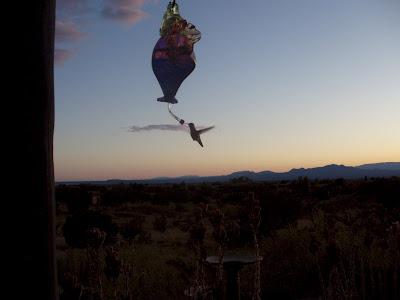One of the interesting things about the online community is the window you get into people’s lives.
Some people post to Facebook or Twitter once or twice a day, little stop-ins to the break room. Others post more frequently. Some in bursts of activity. Others in near-constant streams of updates.
What is striking to me is how often people refer to what they’re watching on TV.
Disclaimer: I’m weird about TV. I really don’t like it. The sound of TV chatter irritates me and I hate hearing it going in the background. I’m psycho enough about this that we don’t have cable or satellite or other feed. We have a television set that we use for the DVD, to play Netflix. But I’m just not a live feed kind of gal. It even bothers me when I click on an article link and discover it’s a video news story. Okay, so there’s that.
So I didn’t “see” any of the Balloon Boy saga yesterday, which was a “a media spectacle of nightmarish dimensions, stunn[ing] viewers nationwide.” The article goes on to say “It began mid-afternoon, and we watched for almost an hour…” Okay, I’m naive, but how is the entire nation watching this for almost an hour? I thought everyone was working then?
I suppose everyone is watching video on their computers. I know Hulu is big — I hear many people reference losing hours to watching old TV shows on Hulu. People also talk about watching movies during the day. Things like “settling in to watch all three original Star Wars movies – yay!”
A lot of these folks are full-time writers.
Which is, of course, my personal brass ring. And when I dream about having that much time to write, I imagine the complex novels I could produce — the ones I can’t quite seem to get my head wrapped around in a couple of hours a day. I think about how much more I could produce.
When I mentioned this to two of be wanna-be-a-full-time-writer friends, about how many writers seem to be watching movies and TV during the day, they both said “I wish!” Which surprised me and, when I said so, they said “Well, I’d like to have that opportunity.”
Of course, I already work from home and they both have the cubicle/commute thing, which I would also hate. And I come from a family of women who don’t fritter away valuable daylight hours. Maybe we all think we’re still desperately tilling the hard Texas soil, but the only time any of us would watch *gasp* DAYTIME TV is if we were sick. One exception: my grandmother religiously watched Days of Our Lives, but for that hour and that hour only. And she always had some sort of mending task set aside, so she could continue to be productive in that hour.
So, I’m wondering now. Is that part of the Writer Dream?
I know plenty of gals who are on various “writing grants” — whether it’s the husband with the well-paying job, the Stay at Home Mom whose kids are in school enough to give her some time to herself, or other kinds of support. I know one gal who left her DC career and lives on her late grandmother’s land and takes care of the property in return for the family’s financial support.
I suppose it all comes down to quality of life. Something unique to each of us.








